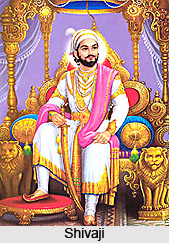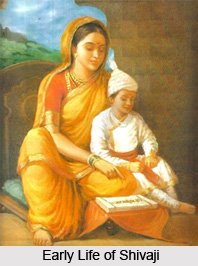 Shivaji is the most popular figure of Maratha history. He was the son of Shahji Bhonsle and his first wife Jijabai. Shivaji was born near the city of Junnar, north of Poona, on 20th April1627. Shivaji aimed to create an independent kingdom from the beginning of his career. In no case he was prepared accept service under a Muslim ruler. In the beginning, Shivaji was inspired by the idea of making free the Hindus from the bondage of the Muslims.
Shivaji is the most popular figure of Maratha history. He was the son of Shahji Bhonsle and his first wife Jijabai. Shivaji was born near the city of Junnar, north of Poona, on 20th April1627. Shivaji aimed to create an independent kingdom from the beginning of his career. In no case he was prepared accept service under a Muslim ruler. In the beginning, Shivaji was inspired by the idea of making free the Hindus from the bondage of the Muslims.
Early Life of Shivaji
Shivaji did not take much interest in formal schooling but he developed a strong determinacy, courage, desire to fight against injustice, faith towards his religion and became master in-handling of all arms. During the first six years of his political; career, Shivaji simply desired to organise the neighbouring Maratha chiefs under him and protect himself. He had to fight against Bijapur to achieve this purpose. During the course of next ten years he encouraged Maratha nationalism and attempted to extend the territory under his rule. He fought against the ablest nobles of Bijapur during this period and succeeded.
Combat of Shivaji with the Mughals
Shivaji got involved into strife with the Mughals for the first time in 1657, because he attacked the Mughal districts of Ahmednagar and Junnar. He was proved wrong since the Mughals engrossed in the conquest of Bijapur, was equally careful towards these two holdings. Shivaji suffered a defeat in the hands of the Mughals. A peace treaty was concluded between the opposing parties. Afterwards, the energetic Shivaji extended his sway to the North Konkan and conquered up to Mahad in the south. The Mughal emperor, Aurangzeb alarmed by the rise of Marathas appointed Shaista Khan, his uncle and Governor of Deccan, to deal with the disruptive elements, the Marathas. He took over Poona, the Fort of Chakan and forced the Marathas to evacuate the Kalyan district. Nevertheless, nothing could weaken the persevering Marathas. Even two years of war-struggle could not drain them of their vitality, and moral strength. The golden opportunity of a regain of previous aura came for Shivaji on the night of 15th April, 1563. He stealthily entered into the city of Poona, with four hundred of his best soldiers. They could reach the abode of Shaista Khan, badly injure him and kill his son. Taken aback, by this sudden raid, the Mughal soldiers were rendered powerless.
Aurangzeb exasperated, by this Maratha disturbance in the Deccan, ordered Jai Singh, the ruler of Amber, and Dilir Khan, the two efficient Mughal generals, to conduct an expedition in the Deccan to devastate Shivaji. The Marathas imparted a tough resistance but had to sign in a peace agreement of the Treaty of Purandhar, on 22nd June 1665. Shivaji and Mughal rivalry was restored in 1670. Shivaji forged ahead to retrieve all the forts, submitted by him in 1665. He furthered his advance, by encroaching upon Mughal provinces and vanquished the imperial force. Such was his achievement that he demanded payment of "Chauth" or taxes paid by the vassal states. All impediments were removed by the tribal uprisings in the north-west. This turned the Mughals` attention away from Deccan. Thus the Mughals` invasion attempts against the Marathas were fruitless. Shivaji, climbing up the highest strata of success and fame, coronated himself at Raigarh, as the Chhatrapati or the King of kings on 16th June 1674.
 Administration of Shivaji
Administration of Shivaji
Shivaji, proved himself successful as a born-leader, a capable soldier, a successful commander and an efficient administrator. Like all other medieval ruler; Shivaji concentrated all powers concentrated in his hands. He possessed all executive and legislative powers. He was the commander-in-chief of the army and had the highest fountain of justice in his kingdom. Shivaji was assisted by eight ministers his administration. Each of them was the head or the pradhan of a department. The prime minister or the peshwa enjoyed superiority, among his colleagues. There were others departmental heads such as the Amatya, the Mantri, the Sachiv, the Sumant, the Senapati and the Nyayadhish. Shivaji had a well maintained army. Cavalry and infantry constituted the primary parts of the army of Shivaji. Shivaji maintained a navy as well. Revenue System during the reign of Shivaji was quite an efficient one. Currency, trade tax and land revenue were the primary sources of the fixed income of Shivaji which led to the prosperity of the population. Shivaji was a cultured Hindu. He understood the spirit of tolerance of Hinduism and practiced it as a person and as a ruler. Shivaji has been regarded as one of the great personalities of medieval India not only because of the fact that he created an independent kingdom but also because he provided an efficient administration.
Extension of Shivaji`s Empire
Shivaji succeeded in establishing an independent kingdom in the Deccan before his death. His kingdom included Maharashtra, Konkan and larger part of Karnataka. It included Ramnagar in the north to Karwar in the south. In the east, it included Baglana, half of the Nasik and the Poona districts, Satara and much of the Colliapur district. It also included that part of western Karnataka which comprised larger part of Mysore, parts of the district of Beilary, Chittor and Arcor. He had imperfect hold over the Kanara region as well. Besides, a large area in the Deccan was under his sphere of influence from where he collected chauth which yielded him an annual income of eighty lakhs of huns. Thus Shivaji succeeded in his aim of establishing a large Maratha Empire.
Shivaji was a worthy son, dependable friend, lovable husband and a lovable father. He greatly respected his mother who was responsible in moulding his character to a large extent. Shivaji possessed virtues of kindness, toleration, good behaviour, courage, chivalry, determination, good intentions etc. According to the tradition of his age, he had several wives but he was a lovable husband to all his wives. Shivaji did not receive much schooling but he developed practical wisdom because of his varied experience. He was a good judge of human nature and circumstances and a practical statesman. Hindu religion and its religious texts had been the sources of inspiration of Shivaji.
One great achievement of Shivaji was that he established an independent Hindu state in Maharashtra though he had to fight not only against Bijapur but also the mighty Mughal emperor, Aurangzeb. Shivaji proved himself a great administrator both in civil and military affairs. Of course, he was not an innovator but learning from the experiences of other rulers, he certainly brought out many changes which were certainly new. The system of Asht Pradhan, Ryotwari system, importance to civilian officers in administration etc. resulted in that administrative machinery which functioned efficiently even during the period of his absence from Maharashtra. That justifies the success of his civilian administration. His military administration was equally successful. Shivaji made Marathi language the court language which helped in the growth of Marathi literature. However, the greatest success of Shivaji was that he created the nation of the Marathas and inspired them to remain independent.






































